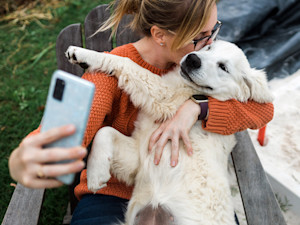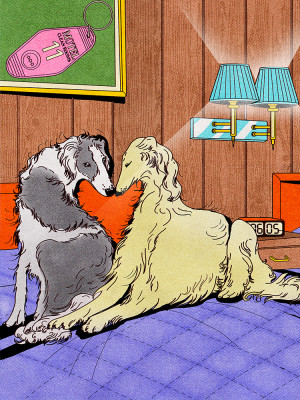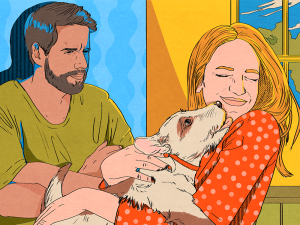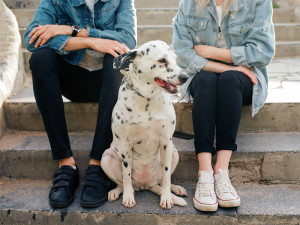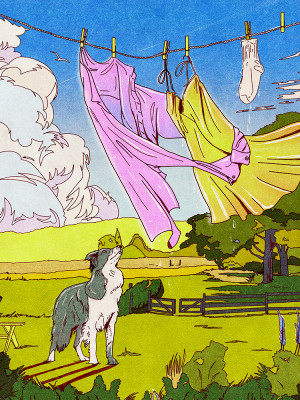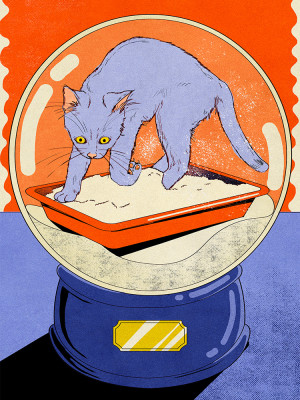Is It OK to Judge Someone Else’s Dog-Parenting Style?
Whether they are a pal or a partner, you’ll have opinions. Here’s what you should (and shouldn’t) do with them.

Share Article
Dear Heavy Petting,
I just moved to Seattle, and my old roommate offered to friend-set-me-up with her friend who lives there. We went on a hike and we hit it off. We had a lot in common: We both love our dogs, we both like being outside.
Our dogs also seemed to have a lot in common: They are both treat-motivated city girls with pretty mediocre recall. The difference was, I kept my city girl on a leash, and this potential new friend did not. We lost sight of her dog immediately. When we found her, she was jumping all over this little group of hikers, and kinda lunging for the nut bars they were eating. She honestly seemed totally friendly and innocuous; she was just an obnoxious mess. And my new friend just laughed it off as she struggled to peel her dog away from this group. She was totally unapologetic. I asked her why she let her dog off the leash, and she got really defensive.
I know off-leash-ing is a touchy subject. I’m not looking to wade into that debate, but I was wondering if I should let this color my judgment about this person in general? This question is about friendship, but I realize I would have similar hang-ups, maybe even stronger ones, if this was someone I was looking to date. Am I too harsh about how people parent their pets?
Sincerely,
A Judgmental and Totally Perfect Dog Parent

Dear Judgmental and Totally Perfect Dog Parent,
I’ve been into ‘70s movies recently and watched Don’t Look Now the other night (not to brag, but my partner has a Criterion membership). One character is asked if she’s religious, and she deflects and answers that she’s kind to children and animals.
I think this is just such a wonderful religion! To me, these are perfect morals! And while I guess we shouldn’t judge anyone ever maybe, we can also absolutely assess their characters. The way people treat creatures more vulnerable than they are seems like a really good access point to analyze them.
Jean Donaldsonopens in new tab, a trainer with Academy for Dog Trainersopens in new tab, puts it flatly: “If they are a terrible pet parent, geez, to be honest, I’d deep-six them strictly on that basis.” Your situation sounds a little more nuanced than that, and most probably are. Donaldson pointed out something she sees a bit, where someone wants to have a dog, or be known to have a dog, but doesn’t really want to take care of the dog. In her words: “If the actual pet’s welfare is parenthetical, but the person is using the pet as an identity tool, then I’d flag it.”
Pay attention to how people treat their pets.
This assessment of this particular type of poor pet parent reminded me directly of a dynamic I witnessed a few years ago. I’d just started dating someone who had a blowhard roommate who had just adopted the sweetest, shyest little skinny Lab puppy. Just to be mean, I’d say for every photo this roommate posted with this puppy to the grid, there was a daily walk he missed.
He left the dog in his room in his apartment for hours. My ex took it upon herself to walk the dog, play, and snuggle. For as much as this made me dislike her roommate, I admired my ex. She’s someone who, when she sees a problem, will step in to solve it. (She was also uncommunicative and loved to be a hero! We all have flaws!)
Ciera Mobergopens in new tab, co-owner and behavior consultant for Instinct D.C.opens in new tab, says that in her experience, “the way that someone interacts with and cares for their pet can certainly give you a lot of insight as to what qualities they might possess. You may very well be able to identify some of the qualities you are looking for in a partner or friend by paying attention to these things.”
Are they attuned to their pets cues of affection and discomfort; are they responsive to their pet’s bids for attention? And you can get insight into their priorities as well. How they parent their pet can show you “how flexible and willing they are to make accommodations to fit their pet into their schedule and life.”
Give them the space to do better.
Melanie Siegelopens in new tab, an associate marriage and family therapist, is supportive about using this as a form of assessment, but suggests giving the person a chance to change. “If you really care about someone but notice they treat their pet in a way that feels off to you, it might be worth letting them know and having a gracious, respectful conversation about it, instead of writing them off or thinking less of them without them knowing.”
How we treat the creatures in our lives is so important. Alexanda Bassetopens in new tab, the lead trainer and behavior specialist at Dog Savvy L.A.opens in new tab, says she’s very attuned to pets’ needs — and feels free to interpret qualities of a human’s character here as well. “Ultimately, it boils down to one’s core values,” she says, “so if values are not aligned, it doesn’t bode well for a future relationship.”
For example, what’s more: Basset also brings up that a poorly behaved pet might not signal a pet parent’s lack of investment — there might have been endless investment. “Some pets have behavioral problems like behaving aggressively, and despite their pet parents' best efforts to find help via training, the animal can’t change its ways,” Basset says. “This makes life difficult and wears down the relationship between a pet and its guardian.”
Wade Mollisonopens in new tab, a therapist at Highland Park Holistic Psychotherapyopens in new tab, agrees this “is a practical way to gauge their nurturing instincts, patience, and overall reliability,” Mollison says. “However, it’s important to consider the broader context of their life and not make a judgment based solely on their pet parenting style.”
Get all the facts before you judge.
Basset expands that there might be other elements at play. “I think a variety of factors need to be taken into account before judging someone about their potential as a romantic partner or friend,” she says. However, that doesn’t mean there isn’t some information to go off of here. Some people can’t afford a trainer or can’t afford to outsource certain dog care — they might be trying their best, and perhaps pet parenthood wasn’t a financially sound decision. But their heart might be in the right place.
And for others, the commitment wasn’t what they imagined, and they just let the dog’s quality of life suffer. “In this case, I think this is a reflection of poor decision-making and how someone values the life of a sentient creature and could be a reflection of what’s to come in the future, but not always,” Basset says. “Sometimes, people just make mistakes but it doesn’t determine how they will behave forevermore.”
As for your friend, it sounds like there was some light lack of responsibility — this doesn’t sound like a safe or contained environment for a rambunctious dog with poor recall. But her intentions were probably to provide the dog with fun and freedom. In sum, I’d say she means well but is oblivious? Not the worst sin, but also not particularly appealing characteristics in a new friend.

Maggie Lange
Maggie Lange is a writer, editor, and columnist. Her work has been featured in New York Magazine, Vice, Guernica, GQ, Rolling Stone, Pitchfork, Elle, and Bon Appetit. She lives in Philadelphia with her favorite brindle boy, Finn.
Related articles
![an illustration of people watching tv with their dog]()
Are You Guilty of Using Your Dog as an Excuse to Stay Home?
Your S.O. planned a date night out, but the dog is looking so cuddly on the couch...
![a dog licking one person while another peron watches grumpily]()
Does Your Pet Like One Person in Your Relationship More?
Pet jealousy can become a thing if one partner feels like the cat or dog is just not that into them.
Does Your Dog Hate When You and Your Partner Fight?
Here are the signs they’re trying to get you to stop.
![a white dog stares up at a pink dress and yellow dress waving outside in the wind on a clothing line]()
When Is It Too Early to Get a Dog Together?
You’re in love, but is it irresponsible to add four paws to the mix? Here’s some input for your consideration.
![an illustration of a cat inside a snowglobe]()
What Happens When the Love of Your Life Is Allergic to the Other Love of Your Life?
You don’t have to choose between your S.O. and your dog or cat — but here’s what may need to happen.

